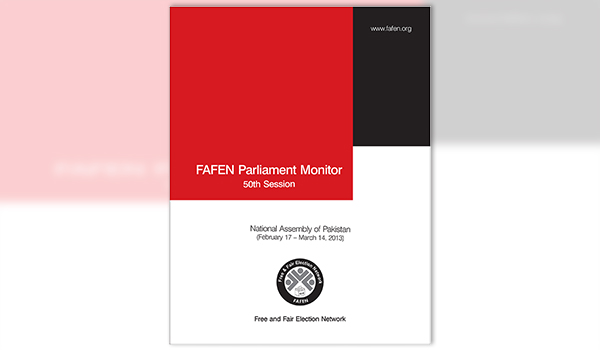The 13th National Assembly, completing its historic five years tenure, achieved a legislative agenda which altered the country’s governance structure by ensuring provincial autonomy and restoring the 1973 constitution, and promoted women’s empowerment.
However, the last session of the assembly was marked by low interest of members as low attendance persisted throughout the session, and the lower house left 70% of the agenda appearing on the Orders of the Day unaddressed.
The 50th session witnessed the passage of bills on counter-terrorism, general elections, education and health. Maintaining the tradition of political consensus over legislation and other national interest issues, the house unanimously passed 15 bills, including two amendments to the Anti-terrorism Act to expand the powers of law enforcement agencies to tackle financing for acts of terrorism and empowering them to detain suspects for a period of thirty days. In addition, a bill was passed to set up the National Counter Terrorism Authority.
Five private members’ bills passed during the last session were related to the prohibition of corporal punishment in educational institutions, reproductive and psychological health, education, and an important amendment in elections laws allowed candidates to file nomination papers through authorized individuals rather than appearing before the returning officer in person. The condition of candidates appearing in person to file nomination papers were introduced in 2002 by the military government to bar the leaders of two main political parties – PPPP and PMLN – from taking part in elections.
The house left 191 agenda items unaddressed, including three government and two private members’ bills, 17 resolutions, 17 motions under rule 259, five calling attention notices and 122 starred questions.
Legislators showed less interest in the proceedings as on average only 17% legislators were present at the outset and end of each sitting of session. Since the National Assembly Secretariat does not make public the attendance record of members, FAFEN observers conduct a headcount at the start and end of each sitting, and document the actual time spent by the Prime Minister, Leader of the Opposition, Speaker and Deputy Speaker.
The Prime Minister attended two sittings while his counterpart, the Leader of the Opposition, was present in four sittings. The Speaker chaired 10 sittings and the Deputy Speaker attended 11 sittings.
The ANP and PML parliamentary leaders remained absent throughout the session. The NPP party head attended nine sittings, followed by PPPS eight, MQM five, BNPA four, PMLF two and MMAP leader attended one sitting.
Overall 187 legislators did not participate during the session. These included 76 out of 127 members of the ruling party (PPPP), followed by 41 out of 92 PMLN members, 33 out of 50 PML, 10 out of 13 ANP, five out 25 MQM, two out of eight MMAP members, and 12 Independents. The single-member parties, BNPA, NPP and PPPS, along with PMLF members did not contribute any agenda for the orders of the day or onfloor debates.
Women members appeared to be more active than their male counterparts. Forty-two (54%) out of the total 78 women legislators activity took part in the proceedings by either submitting an agenda item or taking part in the debates. As many as 112 out of 263 (43%) men took part in the session.
The 50th session spanned over 19 sittings. On average, each sitting lasted two hours and 15 minutes with a delay of 57 minutes. The assembly adopted eight out of 28 resolutions. The house condemned corporal punishment at educational institutions, the Badami Bagh incident, the hanging of Afzal Guru and the defamation of parliamentarians by media, as well as one commending the sacrifices of Benazir Bhutto. All of the taken up resolutions appeared as supplementary agenda.
Legislators spent four hours and 25 minutes of the session debating the law and order in the country through a motion under rule 259. Other motions about the performance of PIA, increasing deficit in Pakistan Railways, unemployment, load shedding and ICT related issues were not taken up. Moved by an MQM member, an adjournment motion regarding the twin bomb blasts in Karachi was taken up.
In the oversight over the executive function of the assembly, legislators posted 413 questions. Forty-one out of 163 starred questions appearing on the agenda were taken up by the house. Additionally, 78 supplementary questions were asked. Most of the questions were regarding the prevailing energy crisis and the deteriorating law and order situation.
Similarly, 12 calling attention notices were taken up about health care, safety devices in vehicles, environmental degradation due to industrial wastes, unscheduled load shedding, deteriorating law and order and increasing number of beggars in Islamabad. Six calling attention notices about railways, drug mafia, Pakistan International Airlines (PIA), aerial firing on wedding ceremonies, nationwide power outage on the night between 24th and 25th of February 2013 and ammunition in Karachi were not taken up Twenty-eight standing committee reports were presented in the house, among them 17 were about bills presented in the house while others were about the power crisis, threats to journalists and media personnel, foreign and domestic loans, allotment of plots to federal employees and accounts of the federal government, as well as reports on the National Counter Terrorism Authority Bill, and of the National Economic Council and the Public Accounts Committee.
The last session witnessed 16 instances of protests and protests which lasted nine hours and 28 minutes. Two protests by MQM and PMLN were over the passage of Shaheed Zulfiqar Ali Bhutto Medical University (PIMS) Islamabad Bill 2013. Walkouts were staged over bomb blasts in Quetta, law and order situation, Badami Bagh incident, increased petroleum prices and killing of laborers in Pasni. A PMLN member staged a walkout after the Speaker ignored the quorum pointed by him.
For complete report click here









